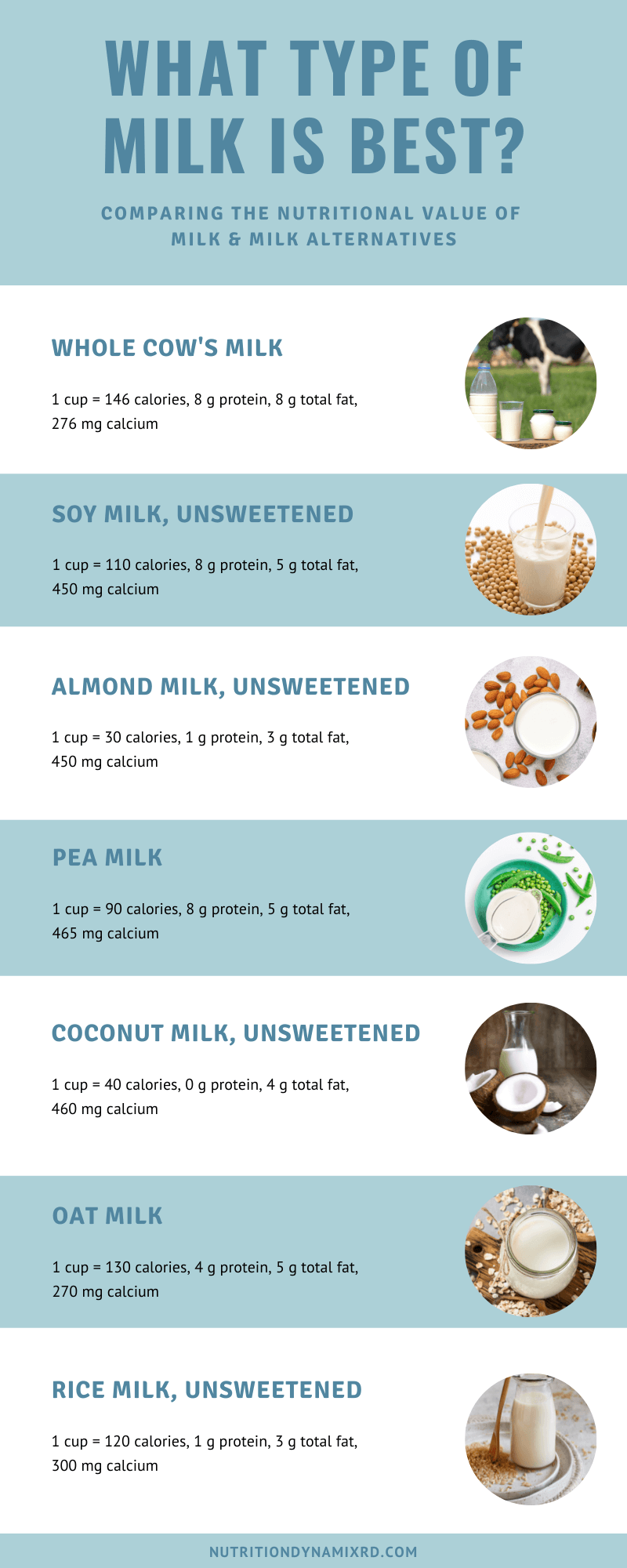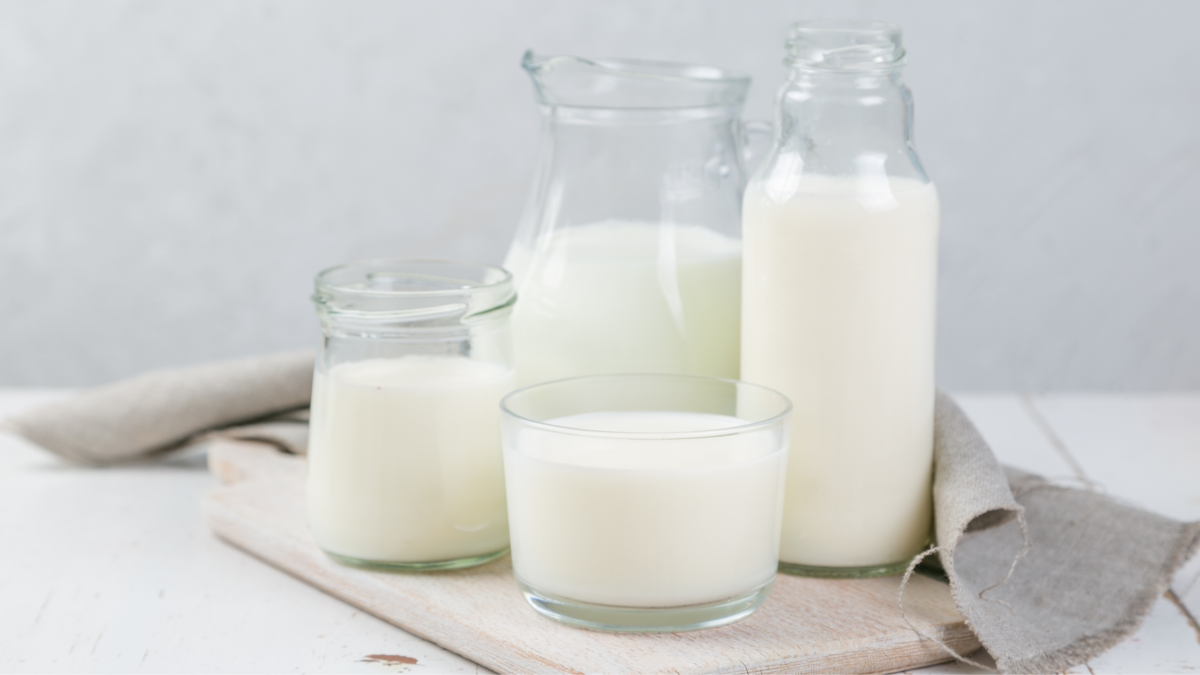Got milk? Step into the refrigerator section of any grocery store and you’ll see a wide selection of milk products, including both dairy and non-dairy options. But do plant milks contain enough calcium? Which is best for the environment? Is dairy more nutritious? Today I’m unpacking the pros and cons of milk alternatives, so read on to learn more!
Why Choose a Milk Alternative?
There are many different reasons you may want to try out a new kind of milk. Vegan and plant-based diets are rising in popularity due to the many positive health aspects. This is prompting more people to move away from dairy.
Some individuals may have a milk allergy or lactose intolerance, leading to life-threatening or uncomfortable reactions to traditional cow’s milk. Others may experience a food sensitivity to the compounds in milk, leading to inflammatory symptoms. This can be avoided by replacing dairy with alternatives.
Consumers are more educated than ever on the antibiotics, hormones, and pesticides frequently used in the dairy industry. You may be looking to minimize your exposure to these by choosing organic dairy or alternatives.
Lastly, choosing certain milks over others may help you reach specific dietary goals, such as reduced calories and saturated fat, or increased protein. Whatever your reason, it’s essential to understand the pros and cons of plant-based milks.

The Pros
First off, it is relatively easy to find non-dairy options on the market that deliver a source of calcium and vitamin D, just like cow’s milk. Calcium and vitamin D are essential nutrients for bone health, and are necessary for proper growth and development. A scientific review of milk alternatives found that fortified plant milks often had even higher levels of calcium than cow’s milk (1). This is often in the form of calcium carbonate, which has a level of absorption equivalent to the calcium found in cow’s milk.
The calorie content of milk alternatives is often much lower per serving than cow’s milk. This makes them a great option for individuals with weight loss goals. A glass of unsweetened almond milk contains about 30-45 calories per cup, while a glass of whole cow’s milk comes in at over triple the calories.
Another benefit of milk alternatives is the wide variety of flavors and consistencies available. Nowadays, you can find unsweetened, vanilla, chocolate, and other flavored plant milks. These can be used for drinking or for incorporating into baked goods and other dishes. The varied textures and fat content of plant milks also makes them great for flexibility in recipes. Thinner milks like almond or cashew are great in cereal or for overnight oats, while richer products like coconut or soy milk are wonderful for homemade "ice cream", whipped cream, or even a latte.
Finally, there are environmental benefits to consuming fewer dairy products. A recent study found that producing one glass of dairy milk results in nearly three times the greenhouse gas emissions as a glass of rice, soy, oat, or almond milk. Furthermore, producing a glass of dairy milk every day for one year requires more than 10 times the amount of land as is required for the same amount of oat milk (2).
The Cons
While choosing milk alternatives over dairy has many benefits, there are a few cons to be taken into consideration. Many of the non-dairy milks on the market are very low or void of protein. Consuming adequate protein is critical for good health, so if you are eliminating dairy it is important to ensure you are getting protein from other sources. Sometimes you count on milk to provide the protein in your meal. This is often the case with a bowl of breakfast cereal. If you are substituting with a low protein option such as almond milk, you'll need to add in protein in another form. Consider sprinkling some hemp seeds or nuts on top. It’s also important to make sure your milk is fortified with vitamin D and calcium, which are vital for bone health. If not, consider your need for supplements to support your bone health.
Another drawback to plant-based milk alternatives is that they often have a longer list of ingredients, including thickeners and sweeteners. These additives can cause inflammation in people with certain conditions such as inflammatory bowel disease, or trigger symptoms in those with food sensitivities (3).
It is important to understand the various pros and cons to consuming milk alternatives, no matter the reason! I hope this article helped you understand some of the things to consider when choosing a milk product so you to make a more informed purchase.
If you have questions or concerns about your diet and what nutritional steps you can take to improve your health, please don’t hesitate to contact me.
If you liked this article, check out my other blog posts including:
What You Need to Know About Bone Health
What Your Poop Can Tell You About Your Health
How to Prevent Muscle Loss as You Age
5 Reasons You May Need Vitamin or Mineral Supplementation
Citations
1. Chalupa-Krebzdak, S., Long, C. J., & Bohrer, B. M. (2018). Nutrient density and nutritional value of milk and plant-based milk alternatives. International Dairy Journal, 87, 84–92. https://doi.org/10.1016/j.idai...
2. Poore, J., & Nemecek, T. (2018). Reducing food’s environmental impacts through producers and consumers. Science, 360(6392), 987–992. https://doi.org/10.1126/scienc...
3. Ruemmele, F. M. (2016). Role of Diet in Inflammatory Bowel Disease. Annals of Nutrition and Metabolism, 68(1), 33–41. https://doi.org/10.1159/000445...


